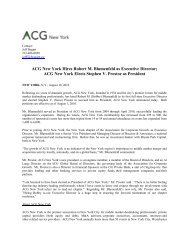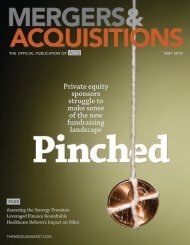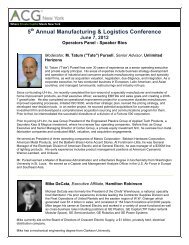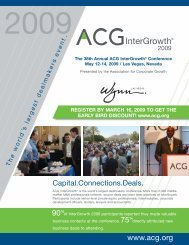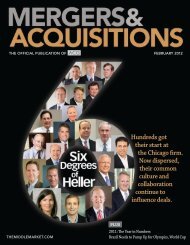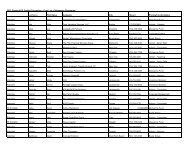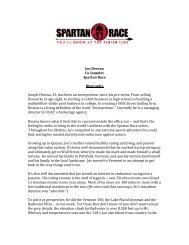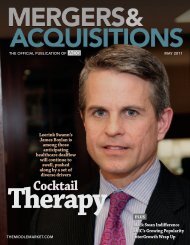Not one to mince words, KPS Capital's Michael Psaros offers a ...
Not one to mince words, KPS Capital's Michael Psaros offers a ...
Not one to mince words, KPS Capital's Michael Psaros offers a ...
- No tags were found...
Create successful ePaper yourself
Turn your PDF publications into a flip-book with our unique Google optimized e-Paper software.
06-08,78-85_ACG.qxd 4/6/09 5:11 PM Page 82COMMUNITY COMMENTARYStaying Ahead of Corruption LiabilitiesCompanies pursuing cross-border deals need a detailed FCPA due diligence process<strong>to</strong> address potential pitfalls.By Ivan R. Lehon, Richard Sibery and Tom PannellThe discovery of bribery of a foreign governmen<strong>to</strong>fficial after closing an acquisitionis <strong>one</strong> of the fastest ways <strong>to</strong> losecompany value, given that the regula<strong>to</strong>ry andlegal fines, penalties and remediation costs canbe significant. Even without regula<strong>to</strong>ry action,fraud and illegal acts pose a barrier <strong>to</strong> operationalefficiency for a strategic or financial buyer.For an inves<strong>to</strong>r, the post-acquisition discoveryof a fraudulently enhanced revenue streamwill not only erode company profitability but willalso impact exit realization and the internal rateof return.As corporations continue <strong>to</strong> acquire newbusinesses, expand globally and enter newemerging markets, they must be cognizant ofthe increased exposure <strong>to</strong> the US Foreign CorruptPractices Act (FCPA) and other internationalanti-corruption laws and regulations. Recently,the US Department of Justice (DOJ) issued anopinion concerning potential FCPA implicationssurrounding a proposed acquisition. The areashighlighted in this opinion demonstrate the needfor companies making global acquisitions <strong>to</strong>have a robust FCPA and anti-corruption due diligenceprocess including an assessment of the“Nearly 30% of companies that acquireda new business in the last two yearsnever or infrequently consideredbribery or corruption risks.”relevant risk fac<strong>to</strong>rs. A detailed FCPA due diligenceprocess can address potential pitfallsseen in high risk market transactions.A significant number of FCPA enforcementactions in 2007 arose in the context of a mergeror acquisition. Yet nearly 30% of companiesthat acquired a new business in the last twoyears never or infrequently considered bribery orcorruption risks in thecontext of a potentialacquisition, according<strong>to</strong> Ernst & Young’s 10thGlobal Fraud Survey,“Corruption or Compliance:Weighing theCosts.” Only <strong>one</strong>-thirdof survey respondentsclaimed <strong>to</strong> have somelevel of knowledge about the FCPA and fully58% of senior in-house counsel were not familiarwith the FCPA.While more than 45% of respondents claim<strong>to</strong> routinely conduct anti-corruption due diligence,the continued flow of FCPA enforcementactions suggests that representations and warrantiesrelating <strong>to</strong> bribery and corruption areonly <strong>one</strong> step in protecting the acquiring companyand its executives from successor liabilities,such as fines, penalties and imposition of a moni<strong>to</strong>r.Furthermore, the purchase price may havebeen inflated if predicated onrevenues obtained due <strong>to</strong> questionablepayments.In many countries, the linebetween state-owned and privateentities is unclear, makingit difficult <strong>to</strong> determine whetherpayments <strong>to</strong> government officialsare occurring. Third-partyagents or consultants may facilitate paymentsof bribes <strong>to</strong> government officials, or may indirectlybe government employees themselves. Illegalpractices may continue after a company“As corporations continue <strong>to</strong> acquire newbusinesses, expand globally and enter newemerging markets, they must be cognizant ofthe increased exposure <strong>to</strong> the US ForeignCorrupt Practices Act.”is acquired, putting the acquiring company atrisk of major fines for the pre- and post-acquisitionactivities of a target company.Experience shows that dealmakers can mitigatethe risk of FCPA non-compliance, evenwithin the limitations of the due diligence period.In a June 2008 opinion commonly known as“the Hallibur<strong>to</strong>n opinion,” the Department ofJustice <strong>to</strong>ok a position allowing Hallibur<strong>to</strong>n <strong>to</strong>proceed with the submission of a bid for a targetwhere due <strong>to</strong> the UK tender offer rules, FCPArelateddue diligence would not be performed untilafter the acquisition closed. The opinionhinged on Hallibur<strong>to</strong>n’s commitment <strong>to</strong> successfullyimplement the comprehensive FCPA andanti-corruption program that the company hadproposed, <strong>to</strong> disclose and promptly resolve anyviolations discovered post-close, and <strong>to</strong> meetthe DOJ’s other rigorous conditions.While this DOJ opinion applies only <strong>to</strong> Hallibur<strong>to</strong>nand its full impact remains <strong>to</strong> be seen,it reflects the high standards the DOJ expects acquirers<strong>to</strong> meet for FCPA compliance and underscoresthe importance of having an FCPA duediligence strategy.The first step in FCPA-specific due diligenceshould be a risk assessment, implemented duringthe initial phase of the overall due diligenceprocess and revisited as new information emerges.82 ACG > MERGERS & ACQUISITIONS February 2009



